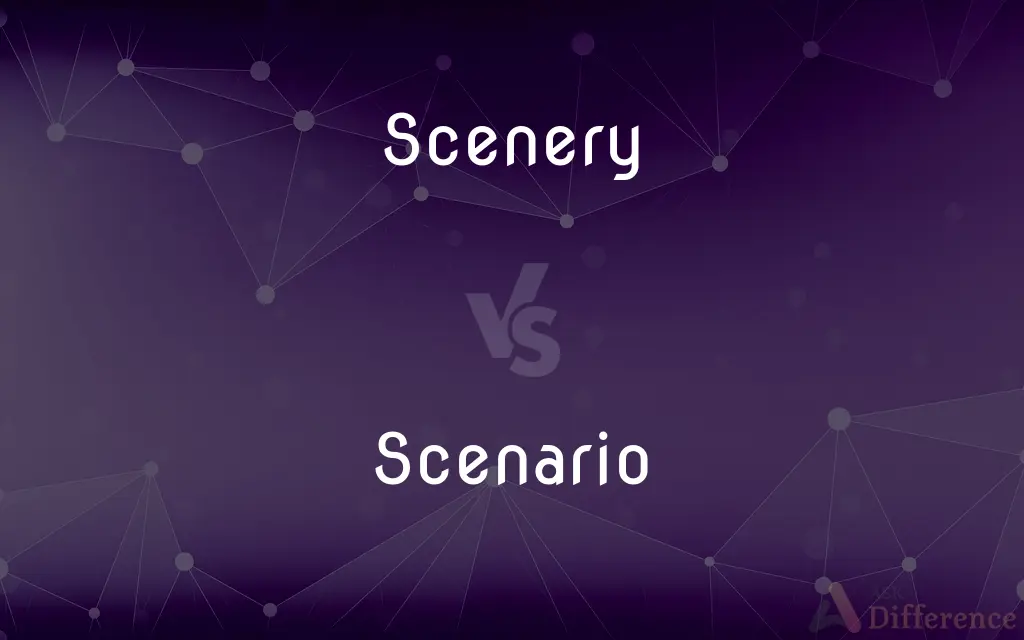Scenery vs. Scenario — What's the Difference?
By Fiza Rafique & Urooj Arif — Updated on March 17, 2024
Scenery refers to natural or artificial landscape views, whereas scenario depicts a situation or sequence of events.

Difference Between Scenery and Scenario
Table of Contents
ADVERTISEMENT
Key Differences
Scenery is primarily about the visual aspect of environments, whether it's the natural beauty of landscapes or man-made settings in theater productions. It's about what the eye can see and the aesthetic value it provides. Scenario, on the other hand, involves a hypothetical or real situation, often used in planning, discussions, or storytelling, outlining a sequence of events or a specific circumstance.
In the context of theater or film, scenery sets the physical backdrop, creating an immersive environment for the story to unfold. Scenarios in these contexts would refer to the plot or storyline that unfolds against this backdrop, guiding the narrative and characters' actions.
When discussing travel or outdoor activities, people often refer to the scenery to describe the visual experience of a place, such as mountains, forests, or urban landscapes. In contrast, when planning or anticipating future events, they might discuss different scenarios to prepare for various possibilities.
Scenery can evoke emotions and set a mood without any narrative context, relying purely on visual impact. Scenarios require a narrative framework, where the emphasis is on the unfolding of events and the interactions within a given setting, regardless of the visual aspect.
Comparison Chart
Definition
The visual aspect of a landscape or environment
A hypothetical or planned sequence of events
ADVERTISEMENT
Context
Natural landscapes, theatrical backdrops
Planning, storytelling, simulations
Function
Provides aesthetic value and sets a visual context
Outlines events, possibilities, or situations
Emphasis
Visual and spatial elements
Narrative and situational developments
Usage
Describing places or settings
Discussing plans, stories, or potential outcomes
Compare with Definitions
Scenery
The backdrop in a theatrical production.
The play's scenery perfectly captured a Victorian street.
Scenario
A written outline of a film, novel, or stage work.
The movie's scenario was engaging from start to finish.
Scenery
The natural features of a landscape.
The mountain scenery took my breath away.
Scenario
A hypothetical situation used for planning.
We considered various scenarios for the product launch.
Scenery
Visual aspects of a place or environment.
The scenic drive offered stunning coastal scenery.
Scenario
A description of possible future events.
The report outlined a worst-case climate change scenario.
Scenery
The arrangement of physical features in a painting.
The artist's use of light in the scenery was remarkable.
Scenario
A sequence of events in a simulation.
The training session involved a disaster response scenario.
Scenery
The visual component of a video game's environment.
The game's scenery was so detailed, it felt real.
Scenario
A setting or background of an event.
The scenario for the debate was a 19th-century political crisis.
Scenery
The natural features of a landscape considered in terms of their appearance, especially when picturesque
Spectacular views of mountain scenery
Scenario
In the performing arts, a scenario (UK: , US: ; from Italian: "that which is pinned to the scenery", pronounced [ʃeˈnaːrjo]) is a synoptical collage of an event or series of actions and events. In the commedia dell'arte it was an outline of entrances, exits, and action describing the plot of a play, and was literally pinned to the back of the scenery.
Scenery
The painted background used to represent natural features or other surroundings on a theatre stage or film set
They had all helped with scenery and costumes
Scenario
An expected or supposed situation or sequence of events
"It was almost impossible to conceive a scenario in which he would fail to qualify for at least three Olympic events" (Jeremy Schaap).
Scenery
A view or views of natural features, especially in open country
Enjoying the varied mountain scenery.
Scenario
An outline of the plot of a dramatic or literary work.
Scenery
Backdrops, hangings, furnishings, and other accessories on a theater stage or on a film or television set that represent the location of a scene.
Scenario
An outline or treatment for a screenplay.
Scenery
View, natural features, landscape.
Scenario
A screenplay.
Scenery
Stage backdrops, property and other items on a stage that give the impression of the location of the scene.
Scenario
An outline of the plot of a dramatic or literary work.
Scenery
Assemblage of scenes; the paintings and hangings representing the scenes of a play; the disposition and arrangement of the scenes in which the action of a play, poem, etc., is laid; representation of place of action or occurence.
Scenario
A screenplay itself, or an outline or a treatment of it.
Scenery
Sum of scenes or views; general aspect, as regards variety and beauty or the reverse, in a landscape; combination of natural views, as woods, hills, etc.
Never need an American look beyond his own country for the sublime and beautiful of natural scenery.
Scenario
An outline or model of an expected or supposed sequence of events.
Scenery
The painted structures of a stage set that are intended to suggest a particular locale;
They worked all night painting the scenery
Scenario
A preliminary sketch of the plot, or main incidents, of an opera.
Scenery
The appearance of a place
Scenario
An outline or synopsis of a play (or, by extension, of a literary work)
Scenario
A setting for a work of art or literature;
The scenario is France during the Reign of Terror
Scenario
A postulated sequence of possible events;
Planners developed several scenarios in case of an attack
Common Curiosities
Are scenarios always fictional?
No, scenarios can be based on real-life possibilities, planning, or hypothetical situations.
Is scenery important in digital media?
Absolutely, in video games and virtual environments, scenery plays a crucial role in creating an immersive experience.
Can scenery exist without a scenario?
Yes, scenery can stand alone as a visual experience, independent of any narrative or scenario.
Does scenery only apply to natural landscapes?
No, scenery can include both natural landscapes and man-made settings, such as urban environments or theatrical stages.
Can a scenario be purely visual?
While scenarios typically involve a narrative, visual elements can play a significant role in setting the scene or conveying part of the story.
How do scenarios aid in problem-solving?
Scenarios allow individuals and organizations to anticipate and prepare for various outcomes, facilitating better decision-making.
Can a scenario change the perception of scenery?
Yes, the context provided by a scenario can significantly alter how we perceive and feel about the scenery.
Can the same scenery fit different scenarios?
Yes, a single scenic backdrop can serve multiple scenarios, each changing the narrative or emotional impact.
Can the same scenario occur in different sceneries?
Yes, a given scenario can unfold in various sceneries, each potentially altering the dynamics and interpretation of the events.
How do writers use scenarios in their work?
Writers craft scenarios to structure their narratives, develop characters, and drive the plot forward within their chosen settings.
How does scenery contribute to storytelling?
Scenery sets the physical and emotional context, enhancing the narrative by providing a visual backdrop to the story.
How do filmmakers use scenery and scenarios together?
Filmmakers carefully choose or design scenery to complement and enhance the scenarios, ensuring coherence and visual appeal.
Do scenarios always follow a linear sequence?
Not necessarily. Scenarios can be nonlinear, exploring multiple pathways or outcomes depending on various factors or decisions.
Are there tools to create digital scenery?
Numerous software tools and platforms allow for the creation of detailed digital sceneries for games, simulations, and virtual reality.
Can scenarios be used in educational settings?
Yes, scenarios are often used in educational simulations and role-playing exercises to enhance learning and problem-solving skills.
Share Your Discovery

Previous Comparison
Unit vs. Unite
Next Comparison
Conventional vs. TraditionalAuthor Spotlight
Written by
Fiza RafiqueFiza Rafique is a skilled content writer at AskDifference.com, where she meticulously refines and enhances written pieces. Drawing from her vast editorial expertise, Fiza ensures clarity, accuracy, and precision in every article. Passionate about language, she continually seeks to elevate the quality of content for readers worldwide.
Co-written by
Urooj ArifUrooj is a skilled content writer at Ask Difference, known for her exceptional ability to simplify complex topics into engaging and informative content. With a passion for research and a flair for clear, concise writing, she consistently delivers articles that resonate with our diverse audience.
















































